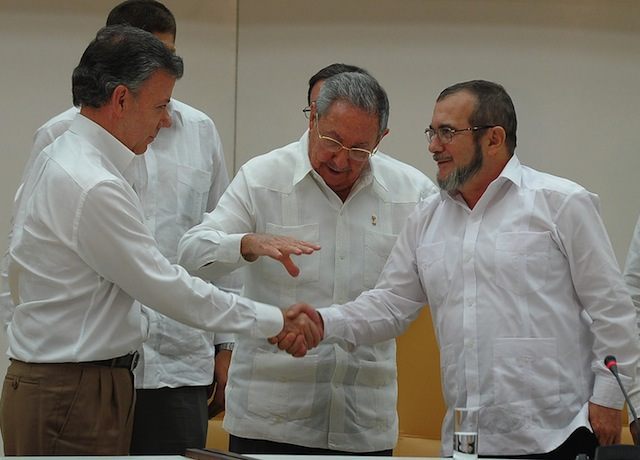Colombian President Juan Manuel Santos has announced an agreement with the head of the terrorist Revolutionary Armed Forces of Colombia (FARC) that will see the creation of a special tribunal to judge the crimes of terrorists, and in return, offer smaller punishments for “political” crimes.
“The chief of the FARC secretariat and I have agreed that in no more than six months this negotiation should come to an end and we should sign a final agreement,” Santos said in Havana, where he met with FARC leader “Timochenko.” In a highly symbolic act for a nation that has been ravaged by FARC terrorism for more than half a century, Santos shook hands with Timochenko, an act in which the two were later joined by Cuban dictator Raúl Castro. “We won’t fail. The time for peace has arrived,” Santos said.
In his remarks, Timochenko put the onus on the Colombian government to treat the terrorists well. “It’s now up to both parties to multiply efforts to construct the consensus that will bring a bilateral ceasefire, agreements about abandoning arms, and the transformation of the FARC into a legal political movement,” he said.
Colombian Interior Minister Juan Fernándo Cristo tweeted that the deal would guarantee an end to the armed conflict against the terrorist group “in a matter of a few months.”
The meeting occurred in Havana as Cuba offered the FARC safe haven to conduct terrorist operations out of Havana, and traveling outside the country would mean near-certain extradition for the leadership of the group.
The centerpiece of the agreement, as described by Colombian media, is the establishment of a special tribunal for FARC members that will judge each terrorist on a case-by-case basis as they surrender their arms to the government. The tribunal will differentiate between “political” crimes and “crimes against humanity.” Political criminals will have five to eight years of “restricted freedom,” which would include community service and the deprivation of some traveling and civil rights.
Jail time may be possible for those who turn in their weapons later or are arrested after the 60-day timeframe the deal imposes. The 60-day clock begins to tick upon the signing of the deal by both Santos and Timchenko, which is expected in March 2016. Upon signing, Santos will bring the deal to the Colombian people via referendum.
Community service tasks would include the removal of land mines in rural areas previously controlled by the FARC and helping replace coca crops planted by the FARC with legal, sustainable plants.
The details regarding the “Special Tribunal for Peace,” which would try crimes against humanity, have yet to be hashed out in talks.
Critics of the deal are loudly protesting the concession of reducing or eliminating entirely jail time for confessed terrorists. Álvaro Uribe, a senator and former president of Colombia, has issued a list of concerns with the deal under the hashtag #AcuerdoDelmpunidad (Impunity Agreement) on Twitter. Among his concerns are the lack of jail time for many terrorists and the “political crimes” provision.
“The government, the President of the Supreme Court, and the Attorney General have accepted from the start that kidnapping and drug trafficking will be forgiven as political crimes,” he writes. “Drug trafficking to finance terrorism is not a political crime–on the contrary, it is a continued, unforgivable atrocity.” He notes also that the government has not demanded that drug trafficking funds go to victims of terrorism and that those who serve their time as per the deal may be eligible to participate in politics in the future.
As president, Uribe–along with President George W. Bush–was responsible for significantly diminishing the size and destructive power of the FARC. Using counterterrorism tactics the United States army honed against al-Qaeda, Colombia managed to reduce the size of the FARC to what it is today, about 8,000 members.
The FARC, nonetheless, remains the wealthiest non-jihadist terrorist group in the world, second only to the Islamic State. It currently makes more than al-Qaeda, Boko Haram, and the Taliban combined, largely through cocaine and other drug sales.
An estimated 200,000 Colombians have been killed by FARC violence, and more than five million have been displaced from their homes. The registry of Colombian victims of FARC violence boasts more than seven million names.
